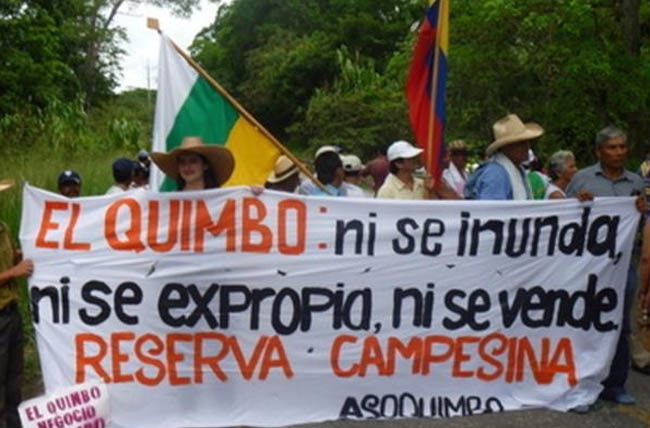One of the two charges being brought against Colombian environmental defenders, Elsa Ardila and Prof. Miller Dussan of the Association of those Affected by the Quimbo Megadam Project (ASOQUIMBO), has been dropped. This was the outcome of court proceedings on Thursday, March 30, 2017 in Garzon, Huila, Colombia.

Both defenders have been facing legal proceedings initiated by Emgesa, the Colombian subsidiary of Italian energy transnational Enel, in relation to their community organising work to resist the Quimbo mega hydroelectric project.
As such, the leaders have spent the past five years living with criminal charges hanging over them. In the first case, Ardila and Dussan stand accused of “obstructing public roads and affecting public order”, following a protest in relation to damages made by the company to local infrastructure. Miller Dussan also faces a second, heavier charge of eight years imprisonment for “instigating the occupation of land” owned by the corporation. Taken together, these charges carry a combined maximum sentence of 16 years for the two leaders.
In October 2016 ASOQUIMBO’s lawyer, German Romero, requested for the first of these charges to be dropped, arguing that those involved in the incident were exercising their constitutional rights to peaceful protest. The Public Prosecutor also later supported this request during proceedings on February 22, 2017.
The first case: Dropped
During Thursday’s one hour hearing, the Judge, in turn, also accepted these arguments and duly upheld Ardila and Dussan’s right to social protest. The case for “obstructing public roads and affecting public order” has now been closed.
Romero made the following remarks after the hearing: “This result proves two things. One, that EMGESA’s attempt to attack ASOQUIMBO’s environmental leaders with judicial harassment tactics has failed and, secondly, that the ASOQUIMBO protest was perfectly legitimate and in accordance with Colombian constiutional norms.”
Local communities in Huila joined together to form ASOQUIMBO back in 2009 to resist the construction of Enel-Emgesa’s Quimbo megadam on the Magdalena River. Through a series of conferences, direct actions and art installations – amongst other interventions – ASOQUIMBO succeeded in shining a light on the gravity of the environmental and human impacts associated with the hydroelectric project. Going beyond local concerns, ASOQUIMBO continues to question the broader mining-energy politics in Colombia and beyond. The movement’s demands are, amongst others, for the construction of localised, sovereign and autonomous politics that respond to the real needs of local communities and that is based upon clean energy alternatives. They also demand an end to the judicial (and of other forms of) persecution being brought against its members.
This decision is said to mark a win for hundreds and thousands of environmental defenders across Colombia and Latin America who are facing forced evictions, brutality and criminal charges for their resistance to the relentless advance of extractivist projects into their communities.
Professor Dussán said: “This shows that international solidarity is effective at blocking these attempts to undermine social protest by means of judicial harassment, and this is an example to follow in other resistente struggles. We have to mobilise locally and connect our efforts to these acts of international solidarity this is how we can make real progress, as the dropping of charges against ASOQUIMBO clearly demonstrates.”
The second case: Ongoing
Although there is cause to celebrate, there also remains work ahead in ensuring that ASOQUIMBO’s leaders are free from persecution. Professor Miller Dussan still faces a second legal charge for “instigating the occupation of lands” as a result of allegations made by Enel-Emgesa. This charge could see the 67-year-old academic locked up for up to eight years.
In response to civil society pressure on the multinational to drop all charges, Emgesa-Enel released a statement on February 21, affirming its intention to “waive any further pending claim” against the leaders of ASOQUIMBO. The corporation also stated that it “has has no interest in a fight with Asoquimbo”.
Although this is said to represent progress for the international campaign and Enel-Emgesa’s words on the judicial persecution of local leaders represent an encouraging next step, they now need to be translated into action.
The El Quimbo Dam is a concrete faced rock-fill dam and hydroelectric power project under development in the Huila Department of southwestern-central Colombia, approximately 69 kilometres south of the city of Neiva, on the Magdalena River. It is valued at $837 million.
Nearly 450 families were evicted from their lands and resettled on less fertile plots of land to allow the filling of the dam’s reservoir. The evicted farmers and their families have reportedly found few employment opportunities in their new homes, and they are said to be finding it difficult to renew their previous occupations of fishing and agriculture.
Emgesa has been accused of failing to conduct a study on the environmental viability of the project. The dam was also allegedly built in a seismic zone, and from the beginning downstream communities have feared that earthquakes could cause dam breakage.
